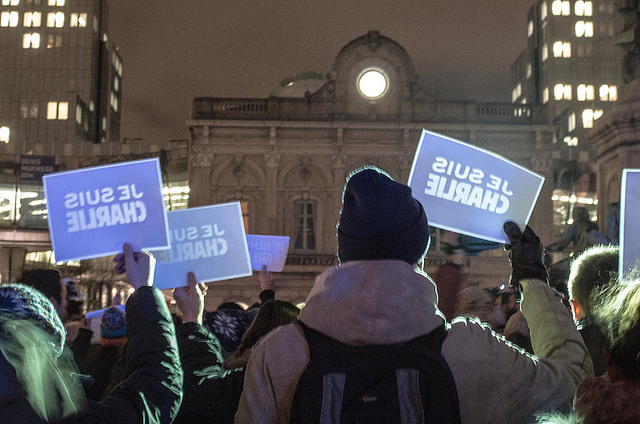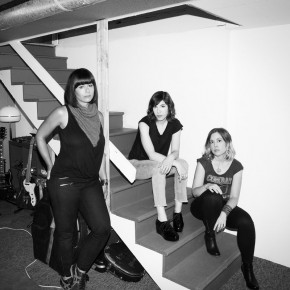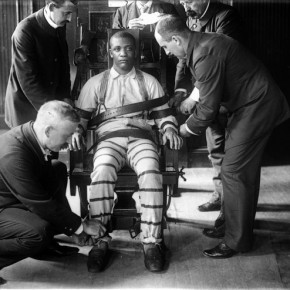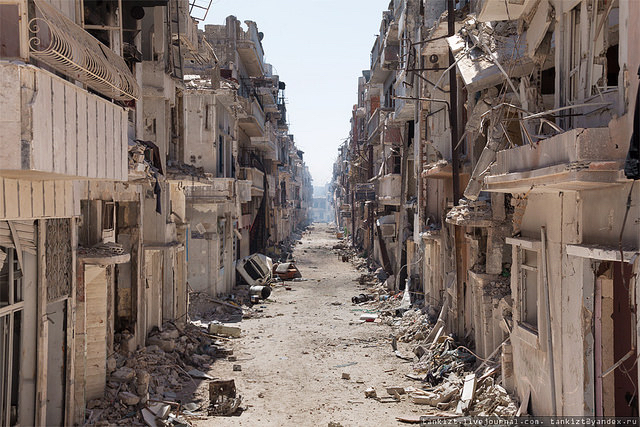Faster than you can say “manufacturing consent”, “Je suis Charlie” has become another “Yes we can!”, a slogan for the self-herding masses, an opiate for the iPhone generation. If that wasn’t clear when it became the Facebook meme of the decade, it sure as hell should be obvious now, after Hollande, Cameron, Merkel and Petro Poroshenko locked arms with Sergei Lavrov, King Abdullah of Jordan, Mahmoud Abbas and yes, Benjamin Netanyahu on January 12, in one grand imperial Chorus Line of the Willing. The only ones missing from the “Je suis Charlie” cavalcade were the Pope, Bush (any one would do) and Bono.
“Je suis Charlie” is at once metaphor and myth, and political myths are opaque in two senses. On the one hand, they offer themselves to a protean multiplicity of interpretations. People from widely divergent backgrounds and with mutually conflicting interests can project themselves onto one and the same event, one and the same narrative or personality.
Barack Obama’s whole presidency, like Bill Clinton’s before him, has hinged on this sort of interpretative vacuum effect, sucking in the ideologies of multiple, often competing constituencies; patting all of them on the back all the time, while pissing down some of their legs some of the time, as the case (or the money train) requires. Obama is a down-home fiscal conservative to some; a liberal champion or even a stymied social democrat to others; to some he’s the Nobel-winning prince of peace, to others the reluctant, or not-so-reluctant, warrior.
Charlie Hebdo, both as magazine and as symbol, is no less equivocal. It is a bold champion of uncensorable truths, a veritable Voltaire animé; or it is a vulgar expression of prevailing prejudice. It is a bulwark against the lurking Islamic bogeyman; or a repository of dark Orientalist stereotypes. It is left; it is anarchist; it is liberal; it is neocon; it is racist. So many pictures, so little time: to each blogger his own private exhibition, to every citizen her own metynomic Charlie.”Je suis” whoever the hell I want Charlie to be.
“Political myth’s opacity also lies in what’s invisible to the myth-makers and myth-consumers themselves, the assumptions that lay hidden beneath the burka of ideology. Why, today, are a million plus Parisians “Charlie“ who were never before Mombasa, or Baghdad, or Hama, or Peshawar, or Fallujah, or Gaza? What kind of identity is it that turns a room full of French cartoonists into “us“, where schoolyards and market places full of Arab and African men and women, young and old, military and civilian failed once to satisfy the equation? What cultural narcissism lies at the root of such universalism? What unspoken hierarchies undergird such outpourings of democratic fervor?

Insidiously, doesn’t “Je suis Charlie” also turn the baudy magazine into a modern-day Jesus de la laicité, a secular Christ who died for the sins of the too-open society? So just how irreligious is the secularism of la grande Nation anyway, which bans the hijab but not the habit? And above all, what does the presence of all those decidedly undemocratic and particularist politicians at this spontaneous outpouring of Western democratic universalism say about its spontaneity, let alone its democracy and universalism?”
Once the political theater empties of its Charlie-fied multitude, the question still remains: What now? Those can-can-stepping politicos in the photo op have more than just fraternité in store for us, that much is sure. Will it be even more bombs over Syria? Mission leap in Iraq? A renewed push against the fictitious Iranian nuclear weapons program? Expanded surveillance across Europe? Will the Charlies in charge now get a little spike in public support for torturing “ticking bombs”?
In France, the axe of political censorship has already started swinging, and more heads are sure to roll. “Moi aussi, je suis Charlie,” said the Charlie fox to the Charlie hen. How depressingly easy it is for so many to be manipulated by the symbiotic interaction of vicious retail violence with the propaganda machinery of the state. How alchemical the transformation of bonafide political virtues like anti-violence or freedom of expression into weapons in the arsenals of national defense and patriotic chauvinism.
Those, after all, are the real values of most of the politicians who hijacked the march in Paris –politicians collectively responsible for more censorship, more violence, more political terror in all its manifold forms and facets than even the berserk holy warriors of al-Qaeda and the Islamic State.
Whether or not we like or even know much about what Charlie Hebdo stands for, of course, we should all mourn the dead in the recent attacks. We should “be Charlie“ just long enough to stick an irreverent tongue out at the worldwide fundamentalist jihad and its brain-dead foot soldiers. But far more urgently, we should refuse to be the Charlies our leaders want us to be; and we should oppose those policies of the “Je suis Charlie” superstars that have done more than anything else to turn some of us into target practice for fanatics. To paraphrase an old saying: the main problem isn’t in Mosul, Peshawar or Damascus; it’s in Washington, London and Paris.
So let’s all be Charlie if we must, but let’s also be real: L’ennemi est chez nous.
Photographs courtesy of Joel Schalit.





